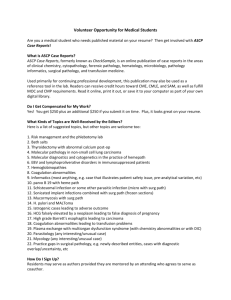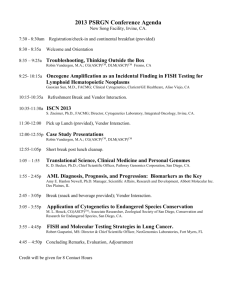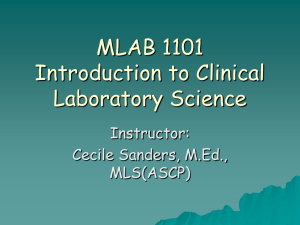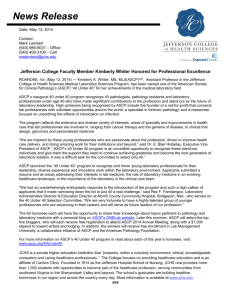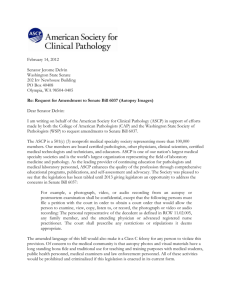The Histotechnologist and Histotechnician
advertisement
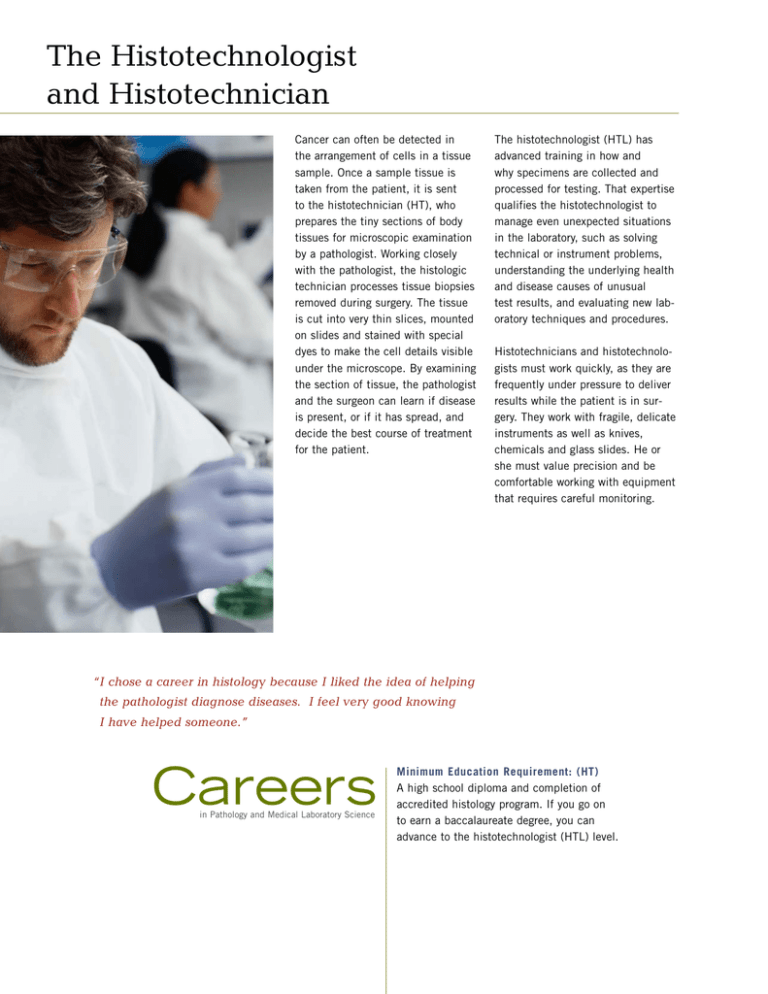
The Histotechnologist and Histotechnician Cancer can often be detected in the arrangement of cells in a tissue sample. Once a sample tissue is taken from the patient, it is sent to the histotechnician (HT), who prepares the tiny sections of body tissues for microscopic examination by a pathologist. Working closely with the pathologist, the histologic technician processes tissue biopsies removed during surgery. The tissue is cut into very thin slices, mounted on slides and stained with special dyes to make the cell details visible under the microscope. By examining the section of tissue, the pathologist and the surgeon can learn if disease is present, or if it has spread, and decide the best course of treatment for the patient. The histotechnologist (HTL) has advanced training in how and why specimens are collected and processed for testing. That expertise qualifies the histotechnologist to manage even unexpected situations in the laboratory, such as solving technical or instrument problems, understanding the underlying health and disease causes of unusual test results, and evaluating new laboratory techniques and procedures. Histotechnicians and histotechnologists must work quickly, as they are frequently under pressure to deliver results while the patient is in surgery. They work with fragile, delicate instruments as well as knives, chemicals and glass slides. He or she must value precision and be comfortable working with equipment that requires careful monitoring. “I chose a career in histology because I liked the idea of helping the pathologist diagnose diseases. I feel very good knowing I have helped someone.” Careers in Pathology and Medical Laboratory Science Minimum Education Requirement: (HT) A high school diploma and completion of accredited histology program. If you go on to earn a baccalaureate degree, you can advance to the histotechnologist (HTL) level. knock out Career Preparation Salaries To prepare for a career as a histotechnologist or histotechnician, you should get a solid foundation in high school sciences — biology, chemistry, math and computer science. You’ll need clinical education in a program accredited by the National Accrediting Agency for Clinical Laboratory Sciences (NAACLS) or an associate degree from a community college and training at a hospital. Preparing for a career as a histotechnologist or histotechnician is a good investment in your future. Your education will prepare you directly for a job. While you’re going to school, you may be able to work part time in a laboratory to earn extra money. And you could start working full time the day after you graduate. According to the ASCP Wage and Vacancy Survey, the average annual salary for histotechnologists in the United States was about $45,000 in 2005. Histotechnicians earned approximately $38,400 a year, and their supervisors made on average $54,000. Scholarships Through the generous contributions of its members and support from Dade Behring, Inc., the American Society for Clinical Pathology (ASCP) offers scholarships to qualified students enrolled in approved laboratory science educational and training programs. All scholarship selection criteria include academic achievement, leadership abilities and community activities, professional goals, and endorsements from faculty and community leaders. Certification To be sure that laboratory workers are competent and able to perform high quality laboratory tests, the ASCP Board of Registry gives a national certification exam. Students take this exam after meeting their academic and laboratory education requirements. Those who pass the exam for histotechnologist may use the initials, HTL(ASCP), after their name to show they are proficient in their field. The designation for a certified histotechnician is HT(ASCP). Certification is valid for three years. To demonstrate competency throughout their careers after their initial certification, histotechnologists and histotechnicians must complete a Certification Maintenance Program every three years. Job Opportunities Today, there are more jobs for histotechnologists and histotechnicians than educated people to fill those jobs. The future long-term employment looks bright. The need is great everywhere throughout the country. Hospitals, for-profit laboratories, clinics, public health facilities, and industry currently have positions open for qualified histotechnologists and histotechnicians. Additional opportunities are available in industrial research, veterinary pathology, marine biology and forensic pathology. process logo and black Opportunities for Advancement A histotechnician who earns a baccalaureate degree and either has one year of experience or attends a NAACLS-accredited histotechnology program can become a histotechnologist. The histotechnologist performs more complex techniques such as enzyme histochemistry, immunohistochemistry and electron microscopy. A histotechnologist can also teach, be a supervisor in a laboratory or be the director of a school for histologic technology. Do you have what it takes All histologic technicians have certain common characteristics. They are problem solvers. They like challenge and responsibility. They are accurate, reliable, work well under pressure and are able to finish a task once started. They communicate well, both in writing and speaking. They set high standards for themselves and expect quality in the work they do. But, above all, they are deeply committed to their profession, and are truly fascinated by all that science has to offer. For someone who chooses a career in the histology laboratory, the exploration never ends. Key Contacts American Society for Clinical Pathology 33 W. Monroe, Suite 1600, Chicago, IL 60603 Phone: 312-541-4999 or 800-267-ASCP (2727) Fax: 312-541-4845, info@ascp.org Certification: www.ascp.org/certification/ Careers: www.ascp.org/careerlinks/ Scholarships: www.ascp.org/careerlinks/scholarships/. General ASCP: www.ascp.org National Accrediting Agency for Clinical Laboratory Sciences 8410 W. Bryn Mawr, Suite 670, Chicago, IL 60631 Phone: 773-714-8880 Fax: 773-714-8886 Accredited Programs: www.naacls.org/search/programs.asp
